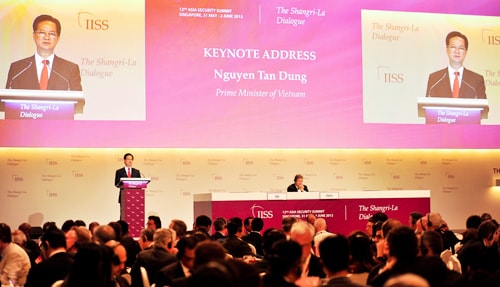Effective multilateral mechanisms for regional security issues
(Baonghean) -On May 31 and June 1, the 13th Asia Security Summit, also known as the Shangri-La Dialogue, will be held in Singapore. Taking place in the context of complicated developments in the East Sea and the East China Sea, the Conference is expected by public opinion to be a place where defense leaders of countries discuss hot issues affecting regional security, thereby having orientations to ensure security and defense in the region...
 |
| “Vietnamese Prime Minister Nguyen Tan Dung delivered the opening speech at the Shangri-La Dialogue 2013 and answered questions from delegates.” |
The largest and most important security forum in the region
At the beginning of the 21st century, the Asia-Pacific region faced many security challenges, from traditional challenges such as the Korean peninsula, Taiwan, the Khasmir dispute between India and Pakistan, to the new threat of terrorism; while concerns about the rise of China also emerged more and more clearly. Originating from the idea of the Munich Conference on Security Policy - a security forum since 1962 gathering experts, defense ministers, senior security officials, press representatives from more than 40 countries with the core being the North Atlantic Treaty Organization - NATO, in 2002, the Shangri-La Dialogue was officially realized by the International Institute for Strategic Studies based in London, UK. The dialogue was attended by 27 countries in the Asia-Pacific, North America and Europe regions, including 10 ASEAN countries and countries such as: China, Japan, Korea, India, Australia, New Zealand, USA, Russia, Canada, France, Germany, UK...
Effective multilateral mechanisms
The ambition of the International Institute for Strategic Studies from the beginning was to establish a formal forum in which defense ministers from all countries in the Asia-Pacific region could sit together to discuss any regional issues. To achieve this goal, the Shangri-La Dialogue's operating mechanism is very diverse. In addition to plenary sessions, there are small groups that can propose separate policy objectives. The Organizing Committee also ensures that defense ministers have at least two multilateral meetings and dozens of bilateral dialogues.
Meanwhile, in order to increasingly expand its influence, the forum has gradually expanded its participants. Initially, it only included the defense minister and relevant senior officials, later expanding to include the chief of the general staff and deputy defense minister, and then senior officials in fields such as intelligence, police, and internal security. The issues discussed have also been diversified; while many scholars, research experts, journalists, and businessmen have also been invited as speakers, creating a multidimensional approach and providing solutions to hot security issues in the region.
Maritime security challenges at the 2014 Shangri-La Dialogue
Many major challenges are being posed to the 2014 Shangri-La Dialogue, in the context of many serious developments in the East Sea and the East China Sea. In particular, China has made neighboring countries particularly worried with many actions such as declaring the establishment of an Air Defense Identification Zone in the East China Sea, or placing a deep-water drilling rig in Vietnam's waters; even having provocative and brazen actions intentionally ramming into Vietnamese ships...
According to the plan, at the 13th Shangri-La Dialogue, Japanese Prime Minister Shinzo Abe will deliver the keynote speech on the evening of May 30. Because according to tradition, each year, the Organizing Committee will invite a Prime Minister or President of a country in the region to deliver the keynote speech, introducing the Conference before the opening session. Next, on May 31 and June 1, there will be 5 plenary sessions on the following topics: US contribution to regional stability; promoting military cooperation; resolving strategic tensions; prospects for peace and security in the Asia-Pacific; ensuring conflict resolution in the Asia-Pacific. In particular, at the Shangri-La Dialogue 2014, for the first time, the strategic document of the International Institute for Strategic Studies will be announced with the title: "Regional Security Assessment 2014".
Vietnam's position and prestige at the Shangri-La Dialogue
Looking back at the 12th Shangri-La Dialogue last year, Vietnamese Prime Minister Nguyen Tan Dung, with his important opening speech, with the concept and vision of “strategic trust”, attracted special attention and spread throughout the discussion sessions. Delegates highly appreciated and believed that the Prime Minister’s speech hit the right note, spoke to the core issues of the disputes and disagreements that have not been completely resolved between countries today, which is because the parties are still skeptical and lack trust in each other. In previous dialogues, Vietnam also actively participated with many topics such as: “Renewing the regional security structure”; “Coping with new maritime security challenges”… And the speeches of the Vietnamese delegation were all of interest and highly appreciated by the countries.
Continuing the message of “strategic trust” and “to have trust, you must act” that the Prime Minister of Vietnam gave at the forum last year, at the Shangri-La Dialogue 2014 this year, Japanese Prime Minister Shinzo Abe is expected to give a strong message that Japan always pursues peace, wants to play a larger role in protecting global security, and all countries need to comply with the law. These messages will certainly be a strong statement sent to any country that disregards international law to provoke, expand and seize what is not theirs, affecting the security of the entire region.
Phuong Hoa






